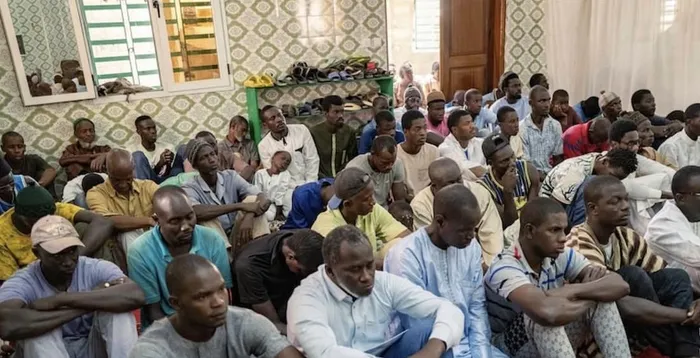Dismantling patriarchy: how Senegal's school for husbands turns men into family men

Senegal’s approach resonates on a global scale, highlighting the truth that dismantling patriarchy is not about vilifying men but about fostering a shared sense of responsibility and positive masculinity.
Image: Sasha Kim b/pexels
I recently scrolled past an Instagram post that made me pause. It was about Senegal’s “school for husbands”, a United Nations-backed initiative where men are taught to share family responsibilities, from childcare to making health decisions alongside their wives.
My first reaction was disbelief: Do men really need to be taught such basic things? But then I remembered a friend’s ex who couldn’t boil noodles, let alone book his own dentist appointment. His excuse? “My mom and sisters always did that for me.” Yikes.
It reminded me of a generational pattern many women know all too well: we cook, clean, raise children, and sometimes even end up raising our partners. This experience is part of a cycle our mothers endured, often with a smile, while society reminded them to “know their place”.
Yet, as times change, more and more women today are refusing these traditional roles, choosing independence, delaying marriage, or opting out altogether. And honestly, can you blame them?
Patriarchy shapes everyday life
Patriarchy isn’t just a buzzword online. It’s a system that has shaped African households for generations. In many places, men are traditionally seen as the head of the household, and women often have limited say. This happens even in educated families.
In an opinion piece for "Ananke", writer Mujidah Ajibola recalls a moment that shook her: her six-year-old son once asked, “Why is she driving? Can’t she give her husband the car?” This, despite growing up in a progressive home.
“It revealed how much patriarchy has eaten deep into the fabric of our society,” Ajibola wrote, noting that even children absorb these messages before they can fully understand them.
These consequences are real. Research from the United Nations Population Fund shows that patriarchal norms limit women’s access to healthcare, family planning, and safe childbirth in Sub-Saharan Africa. When men make all the decisions, women’s health and freedom suffer.
Senegal’s school for husbands
That’s where Senegal’s “school for husbands” comes in. In Dakar, Imam Ibrahima Diane teaches men that being a good Muslim means helping raise children and supporting their wives. He shares his own experience bathing his baby and cooking meals.
Some men laugh, others applaud, but importantly, they listen.
Since its launch in 2011, more than 20 schools have trained over 300 men. According to Senegal’s Ministry of Gender, communities that embrace the program have seen fewer forced marriages, higher use of contraception, and safer childbirth outcomes.
In a report from CNN, “Without men’s involvement, attitudes around maternal health won’t change,” explains Aida Diouf, a health worker who collaborates with the program.
The impact is real: one participant, Habib Diallo, said the school helped him convince his son to support his wife in delivering at a hospital, saving both mother and child from unnecessary risk. These are not small wins; they’re life-saving cultural shifts.
Ultimately, what Senegal is doing points to a universal truth: dismantling patriarchy isn’t about shaming men, it’s about teaching them to share responsibility and embrace positive masculinity.
In the UK, teacher Charlotte Keogh made a similar point at a union conference, urging schools to promote positive masculinity. She warned that when boys feel demonised instead of guided, they turn to toxic corners of the internet, the so-called “manosphere” where figures like Andrew Tate thrive.

Senegal’s school for husbands showcases that this transformation begins with open dialogue, mutual understanding, and education.
Image: Instagram
“It’s left boys feeling inadequate, and they seek out these influencers for hope,” she said. Keogh pushed for programs in schools that support young men’s need for purpose, ambition, and responsibility, instead of silencing them.
This is part of a bigger problem worldwide. If we don’t help men unlearn harmful gender roles, online misogyny will keep growing.
I can’t help but wonder: what would society look like if every boy and girl were encouraged at home, school, or even in religious spaces to be a better spouse, coworker, and father in sameness?
How many women would no longer feel like mothers to their partners? How many daughters would grow up without questioning their right to drive, lead, or dream?
Patriarchy has been around for centuries, but it can change. Senegal’s school for husbands shows that change starts with talking, understanding, and learning. It also shows that men can change not just for women, but for healthier families and stronger communities.
Because here’s the truth: dismantling patriarchy benefits everyone. Men gain deeper relationships, women gain freedom, and children grow up with healthier models of what equality looks like at home and beyond.
So maybe the real question isn’t why do men need to be taught this? It’s how soon can we start?
Related Topics: